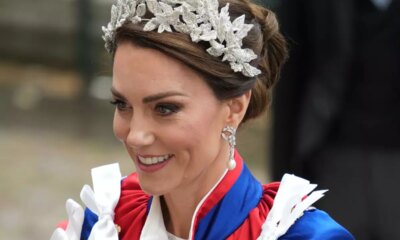Must Read
Princess Charlotte’s Future Role in the Royal Family: What Titles Can She Inherit?
Princess Charlotte, the second child of Prince William and Kate Middleton, holds a significant position as the third in line to the throne, following her father and brother, Prince George.
As the first female royal to benefit from a change made by her great-grandmother, Queen Elizabeth II, to the rules of succession in the 2010s, Charlotte's future as a senior royal is promising.
However, there is one title that she cannot inherit until a certain event takes place.
In 2011, Queen Elizabeth gave her royal assent to the Succession to the Crown Act, which ensured that both sons and daughters of any future UK monarch would have an equal right to the throne.
This act modernized the previous rule that favored male heirs over female members of the royal family.
Queen Elizabeth II herself became the ruling monarch of the United Kingdom due to the absence of a male heir.
If her father had had a son, Elizabeth would have been bypassed in favor of the male successor.
Thanks to the Crown Act, this is no longer the case.
The implications of the Crown Act mean that if, for any reason, Prince George cannot ascend the throne, Princess Charlotte would be next in line instead of her younger brother, Prince Louis.
As she grows older, Charlotte may be granted notable titles and privileges as a senior member of the royal family.
However, there is one specific title, Princess Royal, that she cannot assume until a certain event occurs.
Purely honorary, the title of Princess Royal is the highest honor bestowed upon a female member of the royal family, just below that of Queen Regnant.
Throughout history, there have been seven Princesses Royal, with Anne becoming the seventh in June 1987.
The title is held for life, and according to royal expert Duncan Larcombe, Charlotte will have to wait until the passing of the current Princess Royal, Anne, before she can assume this prestigious title.
Larcombe explains that the title of Princess Royal is traditionally given to the eldest daughter of the monarch.
It took 21 years for Anne to receive the title, as she had to wait until 1987 before her mother, Queen Elizabeth II, bestowed it upon her.
Despite the vacancy since 1965, Larcombe notes that Princess Mary was the previous holder of the title, which she held from 1932 to 1965.
The decision of when and if Princess Charlotte will be granted the title of Princess Royal ultimately lies with her father, Prince William.
As William considers this significant honor, it is worth noting that the title remains for life, symbolizing the importance and respect associated with it.
In conclusion, Princess Charlotte's future role in the royal family holds great promise.
While she cannot inherit the title of Princess Royal until the passing of the current holder, Princess Anne, she will undoubtedly continue to receive notable titles and privileges as she grows older.
The journey towards assuming the highest honor bestowed upon a female member of the royal family is one that requires patience and the passing of time.
As we eagerly await the unfolding of Charlotte's royal journey, we invite you to share your thoughts on this matter in the comments section below.








































